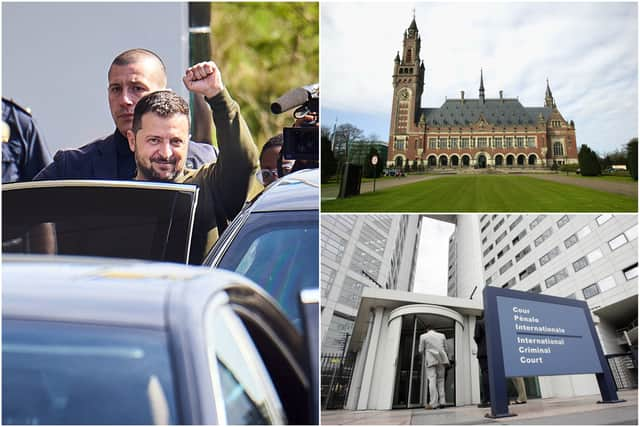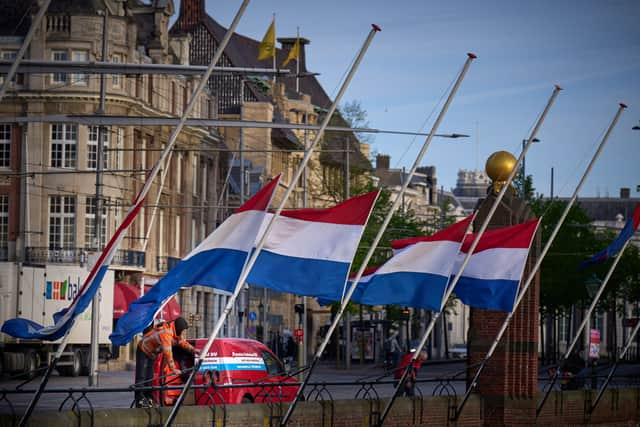The Hague: where is Netherlands city, why is it called Den Haag, what court is there - is it the capital?
and live on Freeview channel 276
Volodymyr Zelensky, the president of Ukraine, has paid a surprise visit to the International Criminal Court (ICC), which has issued an arrest warrant for Russian president Vladimir Putin for alleged war crimes committed in Ukraine.
A day after disputing Ukrainian forces’ involvement in what the Kremlin claimed was an attempt to assassinate Putin using a drone, Zelensky travelled to The Hague, home to both the International Criminal Court and the highest court of the United Nations.
Advertisement
Hide AdAdvertisement
Hide AdMoscow described the incident as an unsuccessful attempt at assassinating Putin, and pledged retaliation for what it called a "terrorist" act.
In the Ukrainian city of Odesa, three drones bearing the inscriptions "for Moscow" and "for the Kremlin," alluding to the alleged attack, struck a dormitory of a learning facility, according to the Ukrainian military. However, the resulting fire was quickly put out, and there were no casualties.
Kyiv's military administration said the capital was also targeted with drones and missiles, in what was the third airborne attack in four days. All of them were shot down. But where is The Hague, and what is the importance of President Zelensky’s visit there? And just where does that relatively unusual name come from?
Where is The Hague?


The Hague (also known in Dutch as Den Haag) is located in the western Netherlands province of South Holland, on the North Sea coast.
Advertisement
Hide AdAdvertisement
Hide AdIt is the third-largest city in the country, after Amsterdam (the capital city) and Rotterdam, and has a population of approximately 550,000 people. It is also the seat of the Dutch government, as well as home to many international organisations and courts, including the International Court of Justice and the International Criminal Court.
The city has a rich history and culture, and is known for its beautiful architecture, parks and beaches, such as the Scheveningen beach, which is a popular destination for swimming and sunbathing.
Why is it called ‘The Hague’?
The name “The Hague” is believed to have originated from the Dutch word “haga,” which means “enclosed hunting ground” or “wooded area.” The city was originally a hunting ground for the counts of Holland in the 13th century, and the name was likely given to it because of its location in a wooded area near the North Sea coast.
Over time, The Hague became associated with the political and legal institutions that were established in the city, as it became the seat of the Dutch government and home to many international courts and organisations.
Advertisement
Hide AdAdvertisement
Hide AdThe use of the definite article “the” in the “The Hague” is a common feature in Dutch place names (it’s worth noting that in Dutch, the city is known as “Den Haag,” which also includes the Dutch definite article “den”), often used to indicate that the place in question is a specific or unique entity, rather than just one of many places with the same name.


The use of “The” in the name may have helped to emphasise the city’s importance as the seat of the Dutch government, and the location of many international courts and organisations. The name is also used to distinguish it from other places with similar names, such as the town of Hagestein in the province of Utrecht.
Today, the name “The Hague” is synonymous with international law and diplomacy, and is recognised around the world as a hub for international justice and human rights.
What is the significance of Zelensky’s visit?
Zelensky’s visit to The Hague has significant symbolic and practical implications, and demonstrates his commitment to seeking justice and accountability for the ongoing conflict with Russia.
Advertisement
Hide AdAdvertisement
Hide AdIt also sends a message to the international community that Ukraine is committed to upholding international law and seeking peaceful resolution through legal and diplomatic channels. Zelensky’s visit also came on National Remembrance Day, the day the Dutch remember their war dead.
In terms of allyship, the Netherlands has been a strong supporter of the Ukrainian war effort since Russia’s invasion last year. No fewer than 14 modern Leopard 2 tanks, promised by Prime Minister Mark Rutte’s government together with Denmark, are expected to be delivered next year.
At least 100 older Leopard 1 tanks were bought by the Netherlands, Germany and Denmark for Ukraine. The Netherlands promised two naval minehunter ships and military forensic experts to assist war crime investigations, on top of sending two Patriot air defence missile systems.
Could Putin be sent to The Hague?
The International Criminal Court has issued an arrest warrant for Putin for alleged war crimes committed in Ukraine.
Advertisement
Hide AdAdvertisement
Hide AdHowever, the possibility of Putin being sent to The Hague appears slim as the court lacks a police force to execute warrants. Furthermore, Putin is unlikely to travel to any of the 123 ICC member states under an obligation to arrest him if they can.
ICC prosecutor Karim Khan is in the process of setting up an office in Kyiv to facilitate his investigations in the country after making repeated visits to Ukraine. However, Putin cannot be tried for the crime of aggression - the illegal invasion of another sovereign state - by the ICC.
An office is being set up to gather evidence, and the Dutch government has offered to serve as the venue for any court that might be established to prosecute the crime of aggression.
According to Eurojust, the European Union’s judicial cooperation agency, the new International Centre for Prosecution of the Crime of Aggression should be operational by the summer.
Comment Guidelines
National World encourages reader discussion on our stories. User feedback, insights and back-and-forth exchanges add a rich layer of context to reporting. Please review our Community Guidelines before commenting.
